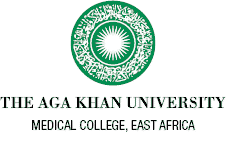Population Health Faculty
Our team consists of highly-skilled
multi-disciplinary faculty with expertise from the medical, public health, social, demography, statistical and policy sciences. Our vision is to contribute to the health of populations, particularly those most in need, by using a population health science approach.
Full-Time Faculty
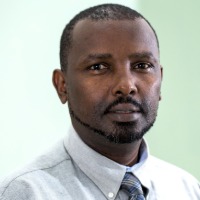 Dr Anthony Ngugi (PhD, MSc, DLSHTM)
Dr Anthony Ngugi (PhD, MSc, DLSHTM)
Associate Professor, Chair and Associate Dean, Research
Dr Anthony Ngugi is the Chair and an Epidemiologist at the Department of Population Health, and Associate Dean, Research at the Aga Khan University Medical College, East Africa. Dr Ngugi is a trained Veterinary Surgeon (2001, University of Nairobi, Kenya). He graduated with a Master of Science Degree in Veterinary Epidemiology and Economics (2007, University of Nairobi, Kenya) and a PhD and Post-graduate Diploma (research) in Epidemiology and Population Health at the London School of Hygiene and Tropical Medicine (2012, London, United Kingdom) on Epidemiology of epilepsy in five countries in Sub-Saharan Africa.
Dr Ngugi is a population health researcher with over 10 years of experience in health research in Africa. His interests include epilepsy, health systems strengthening, community health and maternal and child health and statistical aspects of epidemiology.
He has co-led a large multicenter study of epidemiology of epilepsy covering over 600,000 population in demographic surveillance sites in Kenya, Uganda, Tanzania, Ghana and South Africa. Dr Ngugi has also been involved as a co-investigator in the Countdown to 2015 Kenya Country Case Study and Principal Investigator in the Countdown to 2030 - Kenya Chapter. These analyses are aimed at tracking country progress and its determinants towards the achievement of MDGs and SDGs targets related to Reproductive, Maternal, Neonatal and Child Health.
Dr Ngugi is a member of the International Epidemiological Association (IEA) and the Health Systems Global (HSG). He sits in the global Aga Khan University Research Council (URC), the Aga Khan University (Nairobi) Research Committee (RC), and the Family Medicine Departmental Research Committee (DRC). He also coordinates the Research Methods course for the Medical College in Nairobi.
Publications
Sayed S, Ngugi AK, Mahoney MR, Kurji J, Talib ZM, Macfarlane SB, Wallace T, Saleh M, Lakhani A, Nderitu E, Agoi F, Premji Z, Zujewski JA, Moloo Z (2019). Barriers and the role of Gender to accessing breast health care within a rural community in coastal Kenya. BMC Public Health. 19:180
Keats EC, Akseer N, Bhatti Z, Macharia WM, Ngugi AK, Rizvi A, Bhutta ZA (2018). Assessment of Inequalities in Coverage of Essential Reproductive, Maternal, Newborn, Child, and Adolescent Health Interventions in Kenya. JAMA Network Open. 1(8):e185152.
Ngugi AK, Nyaga LW, Lakhani A, Agoi A, Hanselman M, Lugogo G, Mehta KM. Prevalence, incidence and predictors of volunteer community health worker attrition in Kwale County, Kenya. BMJ Global Health 2018;3:e000750.
_____________________________________________________________________________________________________
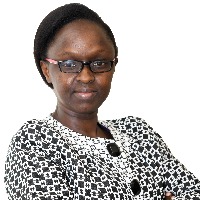 Dr Eunice Muthoni Mwangi, (Phd, MPH, BEd Sci)
Dr Eunice Muthoni Mwangi, (Phd, MPH, BEd Sci)Assistant Professor
Dr Eunice Muthoni Mwangi is a Health Systems Management scientist at the Department of Population Health, Aga Khan University Medical College, East Africa. She holds a Bachelor’s degree in Education and a Master’s in Public Health from Moi University, Kenya and a PhD in Health Systems Management from Kenya Methodist University, Kenya.
Dr Eunice is also a Trainer of Trainers (ToT) in Leadership Management and Governance in Health, and a Certified Public Accountant of Kenya (CPA-K). Dr Eunice has skills and competencies in training and undertaking research in Health Systems Strengthening (HSS), specifically in the areas of Health Care Financing, Health Products and Technologies, Managing Health Workforce, Quality Health Services delivery, Stewardship, and Health Information Management.
Prior to joining the Department of Population Health, Dr Eunice was a lecturer, mentor and researcher at Kenya Methodist University, Department of Health Systems Management in the School of Medicine and Health Sciences.
With more than seven years of experience, Dr Eunice’s work on health and health systems research is focused on informing strategies for achieving Universal Health Coverage. She has published in several peer-reviewed journals.
Publications
Mwangi EM, Tenambergen WM, Mapesa JO, Mutai IK (2019). Citizen engagement in social health insurance purchasing, in selected counties in Kenya. Int J Community Med Public Health 2019;6 DOI: 10.18203/2394-6040.ijcmph20194171
Mwangi, E., Tenambergen, W., Mapesa, J., & Wairia, S. (2019). Role of County Health Governance in Implementation of Social Insurance National Scheme in Selected Counties in Kenya. International Journal of Professional Practice, 7(2), 1-14. Retrieved from https://library.kemu.ac.ke/ijpp/index.php/ijpp/article/view/41
Nelly L. Munyasia, Eunice M. Mwangi, and Wanja M. Tenambergen (2021). Promoting delivery of reproductive health services through legal support and capacity development of healthcare providers in a health provider network in Kenya. Journal of Obstetrics and Gynecology of East and Central Africa. JOGECA | Vol. 33 | No. 4 | September 2021 | | 137-143 | www.jogeca.co.ke.
_____________________________________________________________________________________________________
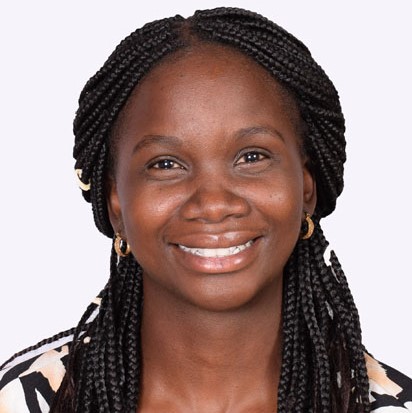 Dr Rosebella Iseme-Ondiek (Clinical Epidemiologist)
Dr Rosebella Iseme-Ondiek (Clinical Epidemiologist)Assistant Professor
Dr Rosebella Iseme-Ondiek is a Clinical Epidemiologist at the Department of Population Health, Aga Khan University Medical College, East Africa, where she teaches research and epidemiological methods as well as provides methodological support to research projects conducted by faculty and students.
She has more than 10 years experience in health-related research primarily focussing on non-communicable diseases. She holds a Bachelor's degree in Biomedical Science as well as a Master of Public Health and a PhD in Clinical Epidemiology and Community Medicine, from University of Newcastle, Australia.
Rosebella's current research activities lay in the area of the gut microbiota-immune system crosstalk in health and disease, and in particular finding ways to modulate this relationship to promote health and disease management in chronic ailments. She is also involved as co-investigator in studies focused on delineating and intervening upon sexual and reproductive health behaviors amongst various Kenyan populations.
She has extensive experience undertaking population based longitudinal studies and randomised controlled trials as well as analysing large longitudinal data sets. Her competency also encompasses management of research projects throughout their life cycle from proposal development, implementation, close out, as well as manuscript preparation and publication. She also provides scholarly review of manuscripts for publication for various journals.
Publications
Iseme, R. A., McEvoy, M., Kelly, B., Agnew, L., Walker, F. R., Boyle, M., & Attia, J. (2018). A cross sectional study of the association between autoantibodies and qualitative ultrasound index of bone in an elderly sample without clinical autoimmune disease. Journal of Immunology Research. Volume 2018, Article ID 9407971, 19 pages.
Iseme, R.A., McEvoy, M., Kelly, B., Agnew, L., Attia, J., Walker, F.R., Oldmeadow, C., Handley, T. (2017). A Role for Autoantibodies in Atherogenesis. Cardiovascular Research. 113(10):1102-1112. Editor's Choice.
Iseme, R.A., McEvoy, M., Kelly, B., Agnew, L., Attia, J., Walker, F.R. (2014). Autoantibodies and, Depression, Evidence for a Causal Link? Neuroscience & Biobehavioral Reviews. 40:62-79.
______________________________________________________________________________________________________
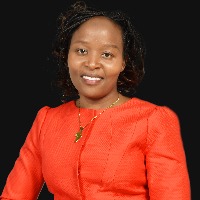 Dr Roselyter Riang'a-Obiria, (PhD, MPhil, BA - Social Scientist)
Dr Roselyter Riang'a-Obiria, (PhD, MPhil, BA - Social Scientist)Assistant Professor
Dr Roselyter is a Social Scientist at the Department of Population Health, Aga Khan University Medical College, East Africa. She holds a PhD in Trans-disciplinary Global Health from Vrije Universteit (VU University) Amsterdam, in the Netherlands, Master’s Degree in Sociology and Bachelors of Arts degree in Social Studies.
Dr Roselyter provides faculty consultative support and training in Qualitative Research methodology, and community engagement best practices in research and innovations. She is interested in understanding human behaviour and how this relates to their adoption of innovations and to translate this understanding into informed guidance on developing contextualized policies and innovations that improve the social and health well-being of people in low-and-middle-income countries.
Dr Roselyter has over 10 years of teaching experience at the university level. Prior to joining Aga Khan University, Roselyter was a lecturer of Sociology and Community Development at Moi University, Eldoret, Kenya, where she mentored and supervised postgraduate and undergraduate students’ research projects. She was also involved in university research projects and held various university administrative appointments. In addition, Dr. Roselyter has worked as an adjunct lecturer for various institutions, and worked in the banking sector retail section, lately as a Customer Care Manager.
Dr Roselyter provides scholarly reviews of manuscripts for publication in various journals, and has conducted a number of qualitative and mixed methods scientific studies and authored a number of publications in highly referenced journals. Her research and publications revolve around maternal nutrition and health interventions, food and nutrition security, gerontology and sustainable development. Her current research activities are in the thematic areas of ageing and health, cervical cancer, and food & nutrition security.
Publications
1. Riang’a RM, Nangulu AK, Broerse JEW. Implementation fidelity of nutritional counselling, iron and folic acid supplementation guidelines and associated challenges in rural Uasin Gishu County Kenya. BMC Nutr. 2020;6: 1–27. doi:10.1186/s40795-020-00403-1
2. Riang’a RM, Broerse J, Nangulu AK. Food beliefs and practices among the Kalenjin pregnant women in rural Uasin Gishu County, Kenya. J Ethnobiol Ethnomed. 2017;13: 29. doi:10.1186/s13002-017-0157-8
3. Riang’a RM, Nangulu AK, Broerse JEW. “I should have started earlier, but I was not feeling ill!” Perceptions of Kalenjin women on antenatal care and its implications on initial access and differentials in patterns of antenatal care utilization in rural Uasin Gishu County Kenya. Moyer CA, editor. PLoS One. 2018;13: e0202895. doi:10.1371/journal.pone.0202895
_____________________________________________________________________________________________________
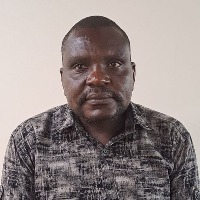 Dr James Orwa Kenyatta, (Biostatistics and Data Science)
Dr James Orwa Kenyatta, (Biostatistics and Data Science)Assistant Professor
Dr James Orwa is a public health researcher and educator with over 15 years of experience. He holds a Bachelor of Science degree in Applied Statistics from Maseno University, an MSc in Biostatistics from Hasselt University, and a PhD in Health Sciences from Ghent University. In addition, he is a data science fellow from University of Michigan under the University of Michigan African Presidential Scholars (UMAPS) program.
Dr Orwa has served as the lead statistician for various household surveys on maternal, newborn, and child health across Kenya, Tanzania, Mali, Pakistan, and Mozambique. He has also been involved in water, sanitation, and hygiene (WASH) programs implemented by the International Organization for Migration (IOM) in East Africa at the same capacity. Additionally, he contributed as a chapter analyst for the Injection Safety section of the 2012 Kenya AIDS Indicator Survey.
Currently, Dr Orwa teaches biostatistics, machine learning, data science, and research methods. His research interests focus on maternal, newborn, child, and adolescent health, as well as TB and HIV. He is also passionate about leveraging data science and machine learning techniques in public health research.
With a strong background in data analysis, Dr Orwa is an experienced tutor in advanced data analysis, where he mentors students and professionals in mastering analytical tools for impactful research.
Publications
Wanyonyi S, Orwa J, Ozelle H, Martinez J, Atsali E, Vinayak S, Temmerman M, Figueras F: Routine third trimester ultrasound for the detection of small for gestational age in low-risk pregnancies (ROTTUS) study: a randomized controlled trial. Ultrasound in Obstetrics & Gynecology 2021.
Orwa J, Gatimu SM, Mantel M, Luchters S, Mugerwa MA, Brownie S, et al. Birth preparedness and complication readiness among women of reproductive age in Kenya and Tanzania: a community-based cross-sectional survey. BMC pregnancy and childbirth. 2020;20(1):636.
Orwa J, Mantel M, Mugerwa M, Brownie S, Pallangyo ES, Mwasha L, et al. Maternal healthcare services use in Mwanza Region, Tanzania: a cross-sectional baseline survey. BMC pregnancy and childbirth. 2019;19(1):474.
_____________________________________________________________________________________________________
 Dr Jackim Nyamari, (PhD, MPhil, BSc. Environmental Health)
Dr Jackim Nyamari, (PhD, MPhil, BSc. Environmental Health)Assistant Professor
Dr Jackim Nyamari is an Assistant Professor in the Department of Population Health at Aga Khan University Medical College, East Africa. He has a Ph.D. in Environmental Health (Kenyatta University - Kenya), a Master of Philosophy in Environmental Health (Moi University - Kenya), and a Bachelor of Environmental Health Science (Solusi University - Zimbabwe). Before joining the Department of Population Health, Dr Nyamari was a lecturer, researcher, and post-graduate studies coordinator at Kenyatta University's Department of Environmental and Occupational Health in the School of Health Sciences.
With over 15 years of teaching experience at the tertiary level, Dr Nyamari has been involved in various research projects and has provided consultancy services to governmental, non-governmental, and international organizations.
Dr Nyamari provides faculty and student support in training and research on Environmental and Population Health issues. His research interests include Climatic Change and Health, Occupational Health and Safety, Injury Prevention, and Air, Water & Food Quality and Safety. He has published several articles in peer-reviewed journals.
Publications
Omondi, G. Z. O., Nyamari, J., & Mugo, J. (2023). Mercury Levels in Groundwater near Artisanal Small-Scale Gold Mines in Migori County, Kenya. East African Journal of Environment and Natural Resources, 6(1), 421-431.
Violet Maritim, Anthony Wanyoro, John Maingi, Jackim Nyamari & Murima Ng'ang' (2023). Impact of community strategy package on uptake of reproductive tract infections health services among young street females in the municipality of Eldoret, Kenya. Gynecology and Obstetrics Clinical Medicine Volume 3, Issue 1, March 2023, Pages 60-64.
Cynthia Vugudza Magero, Jackim Nyamari & Redempta Mutisya (2023). Visual Comfort and Discomfort in Public Boarding Secondary Schools in Nairobi City County, Kenya. East African Journal of Health and Science, Volume 6, Issue 1, 2023.
_____________________________________________________________________________________________________
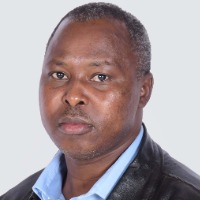 Dr Alfred Keter, (PhD, MSc Biostatistics and Data Science)
Dr Alfred Keter, (PhD, MSc Biostatistics and Data Science)Assistant Professor
Dr Alfred Keter is an Assistant Professor of Biostatistics and Data Science, Aga Khan University, Medical College East Africa. He holds extensive experience in teaching, mentorship, and research, with a career spanning over a decade in biostatistics and public health. Previously, he worked as the survey statistician supporting the Kenya Population-Based HIV Impact Assessment (KENPHIA) II survey at the Center for International Health, Education and Biosecurity (CIHEB) in Kenya (Mar. 2024 – Dec. 2024). He holds a PhD in Statistical Data Analysis from Ghent University, and an M.Sc. in Biostatistics and a B.Sc. in Mathematics/Statistics from Moi University.
Between April 2020 and March 2024, he was a PhD researcher in clinical decision-making in tuberculosis at the Institute of Tropical Medicine (ITM), Antwerp, Belgium, focusing on advanced statistical methods for diagnostic evaluation, treatment thresholds, and clinical decision-making tools in TB.
Dr Keter’s research interests include causal inference, missing data analysis, and the development of statistical methods to support clinical decision-making, particularly in tuberculosis. He has contributed to the global scientific community through oral and poster presentations at international conferences and has authored and co-authored more than forty peer-reviewed research articles. His overarching goal is to use evidence-based research to shape policy and improve health outcomes in resource-limited settings.
Beyond research, Alfred is committed to capacity building and mentorship. He has taught advanced biostatistics, research methods, and data science in higher education institutions, equipping students and professionals with analytical skills for impactful research. With strong leadership abilities, he has successfully mentored junior researchers and provided statistical guidance to clinical scientists, fostering a collaborative research culture that advances innovation in global health.
Publications
Signorell A, van Heerden A, Ayakaka I, et al. Effectiveness and cost-effectiveness of community-based TB screening algorithms using computer-aided detection (CAD) technology alone compared with CAD combined with point-of-care C reactive protein testing in Lesotho and South Africa: protocol for a paired screen-positive trial BMJ Open 2025;15:e093989. doi: 10.1136/bmjopen-2024-093989
Keter, AK., Heerden, AV., Decroo, T., Boyles, T., Bosman, S., Madonsela, T., Msimango, LI., Naiken, L., Kiyan, C., Kamele, M., Ayakaka, I., Reither, K., Mario Jacobs, BK., & Lynen, L. (2025). Estimation of therapeutic threshold for tuberculosis using adapted nominal group technique and clinical vignettes in clinical and community settings in Southern Africa. Journal of Clinical Tuberculosis and Other Mycobacterial Diseases, 40, 100529. https://doi.org/10.1016/j.jctube.2025.100529
Bosman S, Ayakaka I, Muhairwe J, Kamele M, van Heerden A, Madonsela T, Labhardt ND, Sommer G, Bremerich J, Zoller T, Murphy K, van Ginneken B, Keter AK, Jacobs BKM, Bresser M, Signorell A, Glass TR, Lynen L, Reither K. Evaluation of C-Reactive Protein and Computer-Aided Analysis of Chest X-rays as Tuberculosis Triage Tests at Health Facilities in Lesotho and South Africa. Clin Infect Dis. 2024 Nov 22;79(5):1293-1302. doi: 10.1093/cid/ciae378. PMID: 39190813; PMCID: PMC11581699.
_____________________________________________________________________________________________________
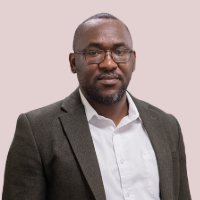 Dr Fredrick Gudda, (PhD, MSc, BSc Environmental Health Scientist)
Dr Fredrick Gudda, (PhD, MSc, BSc Environmental Health Scientist)Assistant Professor
Dr Fredrick Gudda is an Environmental Health Scientist at the Institute for Global Health and Development and the Department of Population Health, Aga Khan University Medical College, East Africa. He is a research faculty working on the intersections of environment, health, and climate change within a One Health framework. Dr. Gudda also supports teaching and research projects by students and faculty working across environmental health domains.
He holds a PhD in Environmental Health Engineering (Nanjing Agricultural University, China), an MSc in Environmental and Occupational Health and a BSc in Environmental Science, both from Egerton University, Kenya. His work focusses on the interconnections of climate and health, the fate and risk of micropollutants in the environment-human pathways, antimicrobial resistance across the animal-environment-human continuum, environmental risk and impact assessment and water, sanitation and hygiene. He has led and contributed to over 40 per-reviewed publications and technical reports.
Dr Gudda previously held research and consulting roles with the International Livestock Research Institute (ILRI), the Aquaya Institute and the National Environment Management Institute (NEMA), Kenya. He also served as a Research Associate and Adjunct Lecturer at Egerton University, Kenya. He is a member of the Environmental Institute of Kenya and a registered Lead Expert in Environmental Impact and Audit Assessment with NEMA.
Publications
1. Gudda F, Muloi D, Nganga F, Nolari C, Gao Y, Moodley A. Antibiotic ecotoxicity and resistance risks in resource-constrained chicken and pig farming environments. npj Antimicrobials and Resistance. 2024 Dec 30;2(1):51.
2. Gudda FO, Moturi WN, Oduor OS, Muchiri EW, Ensink J. Pit latrine fill-up rates: variation determinants and public health implications in informal settlements, Nakuru-Kenya. BMC Public Health. 2019 Jan 15;19(1):68.
3. van Bavel B, Berrang-Ford L, Moon K, Gudda F, Thornton AJ, Robinson RF, King R. Intersections between climate change and antimicrobial resistance: a systematic scoping review. The Lancet Planetary Health. 2024 Dec 1;8(12): e1118-28.
_____________________________________________________________________________________________________
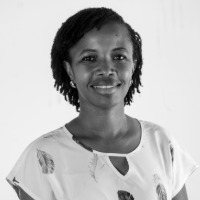 Dr Esther Muthumbi, (PhD, MSc, Clinical Epidemiologist and Infectious Disease)
Dr Esther Muthumbi, (PhD, MSc, Clinical Epidemiologist and Infectious Disease)
Full-Time Faculty
Dr Esther Muthumbi is a Clinical Epidemiologist and Infectious Disease Researcher, Department of Population Health, Aga Khan University Medical College, East Africa. She holds a PhD and MSc in Epidemiology from the London School of Hygiene and Tropical Medicine, United Kingdom, and a Bachelor of Medicine and Bachelor of Surgery (MBChB) degree from the University of Nairobi, Kenya.
Dr Muthumbi has over a decade of experience designing and leading large-scale research programs focused on bacterial vaccine-preventable diseases, antimicrobial resistance, vaccine trials, and real-world surveillance initiatives embedded within national health systems. Her broader research interests include infectious disease epidemiology, antimicrobial resistance, and public health interventions that strengthen health systems in low- and middle-income countries.
She has authored and co-authored several peer-reviewed publications in high-impact journals and continues to contribute to the advancement of evidence-based strategies for infectious disease prevention and control across Africa and beyond.


